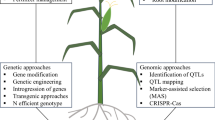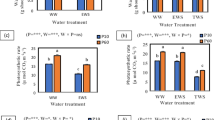Abstract
Background
Elevated carbon dioxide enhances biomass production and final crop yield of C3 species as a consequence of increased photosynthesis, water use efficiency and RuBisCO saturation. However, this enhancement is limited by environmental conditions such as nutrient deficiencies. This study evaluates the interactive effects of K supply (deficient or adequate) and atmospheric CO2 (ambient or elevated) on grain yield and yield related attributes along with allocation of K in different shoot parts (i.e. grains, leaves, stem and peduncle) in bread wheat.
Methods
Bread wheat (T. aestivum cv. Tahirova) was cultivated in soil fertilized with adequate or deficient K in pots under ambient (420 μmol mol−1) or elevated (700 μmol mol−1) atmospheric CO2 conditions in dedicated plant growth chambers. At full maturity, plants were harvested and grain yield and yield attributes along with K status of grains, peduncle, leaves and stem parts were determined.
Results
While K deficiency severely reduced grain yield and yield attributes under both ambient (a-CO2) and elevated (e-CO2) CO2 conditions, e-CO2 significantly enhanced grain yield even in K-deficient plants through maintaining a greater harvest index, spikes per plant and grain weight and thus increased overall K use efficiency. Deficient-K treatment significantly increased grain K concentration as a consequence of “concentration effect”. On the contrary, K concentration in leaf, stem and peduncle was severely decreased whereas e-CO2 had an additive effect on the decrease in K concentrations. Consequently, in deficient-K plants K content (total K accumulated/taken up) in all shoot parts including grains was reduced to only a fraction of adequate-K plants. Moreover, deficient-K plants tended to allocate a greater portion of K in grains as compared to other shoot parts. Elevated CO2 also enhanced K allocation into grains particularly in deficient-K plants.
Conclusion
Potassium deficiency severely reduces grain yield and biomass production in bread wheat in both a-CO2 and e-CO2 environments, however e-CO2 partly alleviates the detrimental effect of K deficiency on grain yield, but not straw yield. Plants under K deficiency stress allocated a greater portion of K in the grains and e-CO2 augmented this effect. In wheat, any one of peduncle, leaf or stem K concentration is a better measure of overall plant K nutritional status as compared to grain K, which may be severely biased due to “concentration effect” in K-deficient plants.




Similar content being viewed by others
References
Asif M, Yilmaz O, Ozturk L (2017a) Elevated carbon dioxide ameliorates the effect of Zn deficiency and terminal drought on wheat grain yield but compromises nutritional quality. Plant Soil 411:57–67. https://doi.org/10.1007/s11104-016-2996-9
Asif M, Yilmaz O, Ozturk L (2017b) Potassium deficiency impedes elevated carbon dioxide-induced biomass enhancement in well watered or drought-stressed bread wheat. J Plant Nutr Soil Sci 180:474–481. https://doi.org/10.1002/jpln.201600616
Cai C, Yin X, He S, Jiang W, Si C, Struik PC, Luo W, Li G, Xie Y, Xiong Y, Pan G (2016) Responses of wheat and rice to factorial combinations of ambient and elevated CO2 and temperature in FACE experiments. Glob Chang Biol 22:856–874
Cakmak I (2005) The role of potassium in alleviating detrimental effects of abiotic stresses in plants. J Plant Nutr Soil Sci 168:521–530. https://doi.org/10.1002/jpln.200420485
Carson PL (1980) Recommended potassium test. In: Dahnke WC (ed) Recommended chemical soil test procedures for the North Centeral Region. Agricultural Experiment Station, Fargo, pp 17–18
De Graaff MA, Van Groenigen KJ, Six J et al (2006) Interactions between plant growth and soil nutrient cycling under elevated CO2. Glob Chang Biol 12:2077–2091. https://doi.org/10.1111/j.1365-2486.2006.01240.x
Dias de Oliveira E, Bramley H, Siddique KHM, Henty S, Berger J, Palta JA (2013) Can elevated CO2 combined with high temperature ameliorate the effect of terminal drought in wheat? Func Plant Biol 40:160. https://doi.org/10.1071/FP12206
Duval BD, Blankinship JC, Dijkstra P, Hungate BA (2012) CO2 effects on plant nutrient concentration depend on plant functional group and available nitrogen: a meta-analysis. Plant Ecol 213:505–521
Fageria NK, dos Santos AB, de Moraes MF (2010) Yield, potassium uptake, and use efficiency in upland rice genotypes. Commun Soil Sci Plant Anal 41:2676–2684
Gray SB, Dermody O, Klein SP, Locke AM, McGrath JM, Paul RE, Rosenthal DM, Ruiz-Vera UM, Siebers MH, Strellner R, Ainsworth EA, Bernacchi CJ, Long SP, Ort DR, Leakey ADB (2016) Intensifying drought eliminates the expected benefits of elevated carbon dioxide for soybean. Nat Plants 2:16132. https://doi.org/10.1038/nplants.2016.132
Hawkesford M, Horst W, Kichey T, Lambers H, Schjoerring J, Skrumsager Møller I, White P (2012) Chapter 6: functions of macronutrients. In: Marschner P (ed) Marschner's mineral nutrition of higher plants, third edition. Academic press, London, pp 135–189. ISBN 978-0-12-384905-2
Hermans C, Hammond JP, White PJ, Verbruggen N (2006) How do plants respond to nutrient shortage by biomass allocation? Trends Plant Sci 11:610–617. https://doi.org/10.1016/j.tplants.2006.10.007
Högy P, Wieser H, Köhler P et al (2009) Does elevated atmospheric CO2 allow for sufficient wheat grain quality in the future? J Appl Bot Food Qual 82:114–121
Hungate BA, Dukes JS, Shaw MR et al (2003) Atmospheric science. Nitrogen and climate change. Science 302:1512–1513. https://doi.org/10.1126/science.1091390
IPCC (2013) Climate Change (2013) The physical science basis. Contribution of working group I to the fifth assessment report of the intergovernmental panel on climate change. Cambridge University Press, Cambridge, pp 1535
Jatav KS, Agarwal R, Singh R, Shrivastava M (2012) Growth and yield responses of wheat [Triticum aestivum l] to suboptimal water supply and different potassium doses. J Funct Environ Bot 2:39–51
Jin J, Tang C, Armstrong R, Sale P (2012) Phosphorus supply enhances the response of legumes to elevated CO2 (FACE) in a phosphorus-deficient vertisol. Plant Soil 358:91–104. https://doi.org/10.1007/s11104-012-1270-z
Karley AJ, White PJ (2009) Moving cationic minerals to edible tissues: potassium, magnesium, calcium. Curr Opin Plant Biol 12:291–298
Kimball BA, Kobayashi K, Bindi M (2002) Responses of agricultural crops to free-air CO2 enrichment. Adv Agron 77:293–368. https://doi.org/10.1016/S0065-2113(02)77017-X
Leakey ADB, Ainsworth EA, Bernacchi CJ, Rogers A, Long SP, Ort DR (2009) Elevated CO2 effects on plant carbon, nitrogen, and water relations: six important lessons from FACE. J Exp Bot 60:2859–2876. https://doi.org/10.1093/jxb/erp096
Leigh RA, Wyn Jones RG (1984) A hypothesis relating critical potassium concentrations for growth to the distribution and functions of this ion in the plant cell. New Phytol 97:1–13
Ma HL, Zhu JG, Liu G, Xie ZB, Wang YL, Yang LX, Zeng Q (2007) Availability of soil nitrogen and phosphorus in a typical rice-wheat rotation system under elevated atmospheric [CO2]. Field Crops Res 100:44–51
Ma Q, Scanlan C, Bell R, Brennan R (2013) The dynamics of potassium uptake and use, leaf gas exchange and root growth throughout plant phenological development and its effects on seed yield in wheat (Triticum aestivum) on a low-K sandy soil. Plant Soil 373:373–384
Maathuis FJM (2009) Physiological functions of mineral macronutrients. Current Opin Plant Biol 12:250–258. https://doi.org/10.1016/j.pbi.2009.04.003
Madan P, Jagadish SVK, Craufurd PQ, Fitzgerald M, Lafarge T, Wheeler TR (2012) Effect of elevated CO2 and high temperature on seed-set and grain quality of rice. J Exp Bot 63:3843–3852. https://doi.org/10.1093/jxb/ers077
Myers SS, Zanobetti A, Kloog I, Huybers P, Leakey ADB, Bloom AJ, Carlisle E, Dietterich LH, Fitzgerald G, Hasegawa T, Holbrook NM, Nelson RL, Ottman MJ, Raboy V, Sakai H, Sartor KA, Schwartz J, Seneweera S, Tausz M, Usui Y (2014) Increasing CO2 threatens human nutrition. Nature 510:139–142. https://doi.org/10.1038/nature13179
Niu Y, Chai R, Dong H, Wang H, Tang C, Zhang Y (2013) Effect of elevated CO2 on phosphorus nutrition of phosphate-deficient Arabidopsis thaliana (L.) Heynh under different nitrogen forms. J Exp Bot 64:355–367. https://doi.org/10.1093/jxb/ers341
NOAA (2017) Recent monthly average Mauna Loa CO2 (retrieved from https://www.esrl.noaa.gov/gmd/ccgg/trends/ on October 11, 2017)
Oren R, Ellsworth DS, Johnsen KH, Phillips N, Ewers BE, Maier C, Schäfer KVR, McCarthy H, Hendrey G, McNulty SG, Katul GG (2001) Soil fertility limits carbon sequestration by forest ecosystems in a CO2-enriched atmosphere. Nature 411:469–472. https://doi.org/10.1038/35078064
Parry M, Rosenzweig C, Iglesias A et al (2004) Effects of climate change on global food production under SRES emissions and socio-economic scenarios. Glob Environ Chang 14:53–67. https://doi.org/10.1016/j.gloenvcha.2003.10.008
Pettigrew WT (2008) Potassium influences on yield and quality production for maize, wheat, soybean and cotton. Physiol Plant 133:670–681. https://doi.org/10.1111/j.1399-3054.2008.01073.x
Reddy KR, Zhao D (2005) Interactive effects of elevated CO2 and potassium deficiency on photosynthesis, growth, and biomass partitioning of cotton. Field Crops Res 94:201–213. https://doi.org/10.1016/j.fcr.2005.01.004
Rengel Z, Damon PM (2008) Crops and genotypes differ in efficiency of potassium uptake and use. Physiol Plant 133:624–636
Sardans J, Penuelas J (2015) Potassium: a neglected nutrient in global change. Glob Ecol Biogeogr 24:261–275. https://doi.org/10.1111/geb.12259
Sardans J, Rodà F, Peñuelas J (2006) Effects of a nutrient pulse supply on nutrient status of the Mediterranean trees Quercus ilex subsp. ballota and Pinus halepensis on different soils and under different competitive pressure. Trees 20:619–632. https://doi.org/10.1007/s00468-006-0077-z
Singh SK, Reddy VR (2017) Potassium starvation limits soybean growth more than the photosynthetic processes across CO2 levels. Front Plant Sci 8:991. https://doi.org/10.3389/FPLS.2017.00991
Singh SK, Badgujar G, Reddy VR, Fleisher DH, Bunce JA (2013) Carbon dioxide diffusion across stomata and mesophyll and photo-biochemical processes as affected by growth CO2 and phosphorus nutrition in cotton. J Plant Physiol 170(9):801–813
Taiz L, Zeiger E (2010) Plant physiology. Sinauer Associates Sunderland, MA
Teixeira PC, Gonçalves JLM, Arthur Junior JC, Dezordi C (2008) Eucalyptus sp. seedling response to potassium fertilization and soil water. Ciên Flores 18:47. https://doi.org/10.5902/19805098510
Wheeler TR, Batts GR, Ellis RH, Hadley P, Morison JIL (2009) Growth and yield of winter wheat (Triticum aestivum) crops in response to CO2 and temperature. J Agric Sci 127:37. https://doi.org/10.1017/S0021859600077352
White PJ (2012) Chapter 3. Long-distance transport in the xylem and phloem. In: Marschner's mineral nutrition of higher plants, third edition, pp. 49-70. Marschner P, ed. academic press, London. ISBN 978-0-12-384905-2
White PJ (2013) Improving potassium acquisition and utilisation by crop plants. J Plant Nutr Soil Sci 176:305–316
Wu DX, Wang GX, Bai YF, Liao JX (2004) Effects of elevated CO2 concentration on growth, water use, yield and grain quality of wheat under two soil water levels. Agric Ecosyst Environ 104:493–507. https://doi.org/10.1016/j.agee.2004.01.018
Xie Q, Mayes S, Sparkes DL (2015) Carpel size, grain filling, and morphology determine individual grain weight in wheat. J Exp Bot 66:6715–6730. https://doi.org/10.1093/jxb/erv378
Yang XE, Liu JX, Wang WM, Ye ZQ, Luo AC (2004) Potassium internal use efficiency relative to growth vigor, potassium distribution, and carbohydrate allocation in rice genotypes. J Plant Nutr 27:837–852
Yilmaz O, Kahraman K, Ozgur R, Uzilday B, Turkan I, Ozturk L (2017a) Growth performance and antioxidative response in bread and durum wheat plants grown with varied potassium treatments under ambient and elevated carbon dioxide. Environ Exp Bot 137:26–35. https://doi.org/10.1016/j.envexpbot.2017.01.012
Yilmaz O, Kahraman K, Ozturk L (2017b) Elevated carbon dioxide exacerbates adverse effects of mg deficiency in durum wheat. Plant Soil 410:41–50. https://doi.org/10.1007/s11104-016-2979-x
Zhao D, Oosterhuis D, Bednarz C (2001) Influence of potassium deficiency on photosynthesis, chlorophyll content, and ultrastructure of cotton plants. Photosynthetica 39:103–109. https://doi.org/10.1023/A:1012404204910
Acknowledgments
This research forms part of PhD dissertation of Muhammad Asif. The authors thank to Prof. Richard Bell of Murdoch University, Australia for valuable comments and proof-reading of the manuscript.
Author information
Authors and Affiliations
Corresponding author
Additional information
Responsible Editor: Philip John White.
Rights and permissions
About this article
Cite this article
Asif, M., Tunc, C.E. & Ozturk, L. Changes in yield attributes and K allocation in wheat as affected by K deficiency and elevated CO2. Plant Soil 426, 153–162 (2018). https://doi.org/10.1007/s11104-018-3603-z
Received:
Accepted:
Published:
Issue Date:
DOI: https://doi.org/10.1007/s11104-018-3603-z




